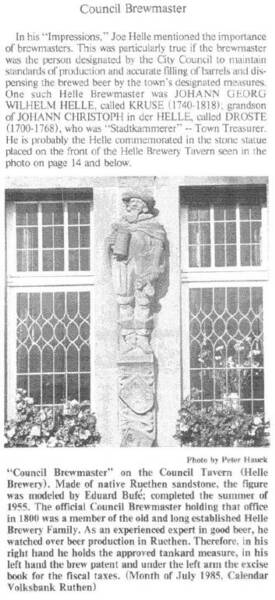The brewery business was a major occupation of Helle Family members of Ruethen in each generation. The following description and history of beer brewing provides a glimpse into the daily lives of these ancestors.
"About Beer Brewing in Ruethen"
by Ulrich Grunt translated by Dietmar Helle
It is self evident that in a medieval town such as Ruethen beer was brewed. Beer, more than any other beverage, was the most common in use. Originally the average household made beer for its own use. In early times beer was made by fermenting bread. Later barley and other grains were malted and fermented. In later times some dozen houses specialized in brewing beer and sold the surplus. These house breweries could not support their households from the sale of beer so most also made and sold baked goods. Thus, the by-products of the brewing of beer became useful. Not everyone could afford the necessary brewing equipment, especially the copper kettle; therefore, the town of Ruethen owned a copper kettle which was borrowed by smaller householders for their use.
Putting beer into barrels became more and more common and increased business. As a consequence, the tax collectors saw an opportunity to collect another tax. An excise tax known as "Bruggerzise" was imposed from 1447 onward on beer, hops and malt. Revenue from this tax was used to repair the town walls. After the Thirty Years' War the Cologne archbishops ordered the citizens of the smaller villages around Ruethen to buy all their needs -- beer, bread, clothes, daily necessities -- in Ruethen to increase the taxes collected by the citizens of Ruethen to maintain and rebuild the walls and gateways.
The importance of beer brewing and barreling can be seen in a decree given out by the town council in 1643. "Every citizen must be provided with good beer. The beer must be fresh and made out of good grain produced legally. The production must be right and the filling of the barrels by the town's measures. The small and false measures must be eliminated."
The Franciscan monks in the Ruethen monastery made a good beer. In 1726 they built their own brew house southwest of the monastery hospital (now the house of Dr. Kotters.) In 1761 they made a much larger brew kettle which weighed 556 ounds. According to the chronicle of the monastery it cost two hundred Reich - staller -- Imperial Dollars.
Two individual Ruethen brewers became well known. In 1526 the baker Johann in der Helle sold his beer to the town, many of his family did afterwards. Besides Brewery Helle, another developed a big business in the beginning of the nineenth century -- the Brewery Graesy (now House of Konrad), Knickenberg and Brennerie Meschede.
A brewmaster usually had a big hall behind his house herein was the brewing equipment and a large malt attic. To begin the brewing process the barley was dropped from the attic into a large vat and soaked in clear water until the starch became sweet malt. The malted barley (green barley) dried in the attic becoming brown barley. It was coarsely ground, put to the brewing kettle and cooked with hops.
When cooking ended, the mixture was cooled quickly to maintain the desired taste. Because of the cooling process, the doors of the brewery remained wide open. The mixture had ferment to beer within two to eight days. A workshop was needed to repair the large vats, tubs and barrels. Some brewery horses were used to turn the "Gospelwerk" -- treadmill --which raised the heavy loads.
By 1962 it became uneconomical to maintain the last small brewery in Ruethen. A big brewery bottles beer and distributes it in this area using a Ruethen license and name.
=====================================================================================
A Poet in the Family
XII. FRIEDRICH WILHELM HELLE
FRIEDRICH WILHELM HELLE
b. Bockenford, Lippstadt Co.,
c. 28 Oct. 1834
d. MiJnchen; 4 Aug. 1901
MiJnchen; 4 Aug. 1901
m. Dortmund; 13 May 1871
Dortmund; 13 May 1871
AUGUSTE STEGT
b. Hattingen, Ruhr; 9 Aug. 1840
Hattingen, Ruhr; 9 Aug. 1840
d. Munster; 26 Feb. 1909
Munster; 26 Feb. 1909
FRIEDRICH WILHELM HELLE, Dr. of Philosophy, great - great - great - grandson of JOST (JODOCUS) in der Helle, called KRUSE (c. 1625/26 - 1702) is especially well known as the poet of a Catholic epic poem "Jesus Messias," a one-volume work published in 1870. A monument to this poet has been erected beside the parish church in Lippstadt.
XIV. JOSEF WILHELM AUGUST
JOSEF WILHELM AUGUST
"WILLY" HELLE, called JOSEL
b. Ruethen; 5 Aug. 1901
Ruethen; 5 Aug. 1901
m. 1st - Ruethen; 12 Oct. 1928
1st - Ruethen; 12 Oct. 1928
b. Ruethen; 29 Aug. 1899
Ruethen; 29 Aug. 1899
d. Ruethen; 15 Oct. 1960
Ruethen; 15 Oct. 1960
AGNES EICKHOFF
b. unknown
JOSEF WILHELM AUGUST "WILLY" HELLE, called JOSSEL, was the son of WILHELM HELLE, called JOSSEL (1863 - 1932), and grandson of JOSEPH ADAM and MARIA WIEGENSTEIN HELLE. "Willy" continued the family tradition of becoming a brewmaster and inherited the family business at Hachtorstrasse 23 in Ruethen. As mentioned above, having no issue, he adopted Wolfgang Helle, oldest son of Fritz and Leni (Fromm) Helle.
=====================================================================================
In Search of Opportunity
Marriage, adventure, religion, economic opportunity and war induced Helle Family members to emigrate from Ruethen to other German principalities, other countries of Europe and to the New World. Indexes on the scroll trace many to Hungary, Brazil, Chile, Checkoslovaki, Poland, Holland, England, France, Italy and the U.S.A.
Those recored going to the U.S. are;
Dyersville, Iowa---Johann "John" Helle 1864-1938
Indianapolis, Indiana---Joseph Helle 1865-1929
New York, NY---Caroline Antonia Helle 1866- (married a Schmidt)
Philadelphia, Pennsylvania---Henrietta Helle 1819-1887
Winona, Minnesota--- Anton Joseph Helle 1827-1890 Ropemaker and farmer.
Smithfield, Illinois---Fred Helle 1835-1907
use back button to return
